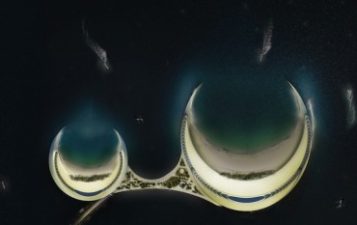Once upon a time people lived in a different kind of harmony with nature (can you imagine yourself pictured above?). Except for the aristocracy who lived in castles and lords who collected taxes on land, most people all over the world, especially in the Middle East, prayed for rain and sun in the summer in order to grow a bounty of crops.
There were no grocery stores and food wasn’t flown into organic farmers’ markets. In the winter, people ate roots and winter food. They learned how to stave off colds and bulk up fat reserves to make it through to the next spring. Times were tough.
Chances are, if you were born any time before the industrial revolution, most of your energy was spent on survival. Imagine, if you weren’t busy collecting, growing or storing your food, time was probably used for finding firewood, maintaining your home or shelter and doing tedious chores to maintain life.
Fast forward to today
In the last hundred years or so, it seems as though we have made our lives a whole lot better by inventing machines that can do our dirty work, allowing us to focus on matters more spiritual in nature (or so we think.)
We have dishwashers, cars, computers and communication and bank machines – our society has given birth to a whole new generation of people who don’t even need to ever leave the house.
Relying on the tools of computers, digital farmers like me, can even work from the comfort of our living rooms, ordering food and supplies through the phone or Internet. When our food arrives in boxes and packaging, we can nuke it the microwave and wash it down with an energy drink fortified with all the vitamins we will ever need.
With so many possibilities, and free time for creativity and introspection (we don’t even have to cook!) why is it that there is so much unrest and dissatisfaction among people today?
Ecotherapists asks questions about illness
Was sickness always there and people didn’t notice it, or is it possible that disease is related to the earth, nature and the condition of the world in general? These are the kind of questions ecotherapists ask.
In the realm of mental health practitioners, most believe that sickness comes about when a person ‘disconnects’ between how they act and how they process the impact of their actions. As the person spirals out of connection between what they do and how their actions affect those around them – long-term harm and a serious pathological illness can ensue.
Some proponents of ecotherapy suggest that instead of taking anti-depressants like Prozac and other pills, we might do ourselves good by going outdoors in nature. This approach acknowledges that people in industrialized and western cultures, are trapped in a cycle of abuse – disconnected from and therefor damaging nature.
The way humans have abused the world can be felt everywhere: glaciers are melting from global warming; and as a result we’re harming animals and their habitat; pesticides in produce and on our lawns are causing cancer; factory pollutants and car emissions are giving people asthma. This list of destruction goes on and on.
Taking a down-to-earth approach for teaching the tenets of ecotherapy is ecopsychologist Craig Chalquist from the Sonoma State and John F. Kennedy Universities in the US. He believes ecotherapy ‘best practices’ can help our future survival on the planet.
He says, “With all the urgent talk about peak oil and a post-carbon future, we hear very little addressing the social or psychological implications of living in such a world. And yet what point is survival if we don’t survive whole?
“My thought is that rather than waiting around for the empire to fall, or spending a fortune stockpiling bullets and dried apricots, why not see all this as an opportunity to experiment with practices that have been used the world over by people in peaceful communities: conflict resolution, the practice of council, clear communications skills, indigenous ways of knowing, town hall democracy, practical psychology and restorative justice.”
Hear, hear! These are some ideas we could put to practice in the Middle East.
Getting out in natural surroundings
There are two approaches to ecotherapy: one is earth-centered and teaches that being in wild nature will help remind us that we are a part of the world and not its dominators.
When one can actually feel as though the earth is part of oneself, it becomes easier for us to do things that can sustain and heal the earth.
A second path in ecotherapy is a person-centered approach where the ecotherapist recognizes that first the individual needs to be treated.
Using wild nature as a means for reflection, the individual is encouraged to reconnect spiritually, with sustaining earth to be the next step in the healing process.
Researchers find proof ecotherapy works
Recent research published in the UK, confirms what we might have known all along: country walks can bring startling reductions in depression and raise self-esteem. The University of Essex compared how a 30-minute walk in the country compared to a walk in an indoor shopping centre.
After the country walk, 71 percent of the people reported a decreased feeling of depression and said they felt less tense. This finding was in contrast to 45 percent of the people who felt a decrease in depression after the shopping centre walk, with 22 percent of the people of the shopping center group saying they felt more depressed after the walk.
 The center “Mind” that helped publish this study describes ecotherapy as “getting outdoors and getting active in a green environment as a way of boosting mental well-being.” Although some of the ideas taught by ecotherapy seem obvious, some deeper philosophical aspects deserve reflection.
The center “Mind” that helped publish this study describes ecotherapy as “getting outdoors and getting active in a green environment as a way of boosting mental well-being.” Although some of the ideas taught by ecotherapy seem obvious, some deeper philosophical aspects deserve reflection.
Paul Farmer, head of Mind, says ecotherapy will be an important part of the treatment used by mental health professionals in the future: “It is a credible, clinically-valid treatment option and needs to be prescribed by GPs, especially when for many people access to treatments other than anti-depressants is extremely limited.”
Cheaper than anti-depressant drugs, walking in the countryside has no side effects and is readily available on most everyone’s doorstep.
Some countries in Europe have taken the ecotherapy approach to heart and have started using it in farms to treat mental distress. In Holland, they send mentally ill patients to be ‘prescribed’ workers on one of 600 nation-wide farms as a bona fide component of the healing process.
Healing with the help of nature, seems a bit like common sense. Maybe we have to write this long article to remind you what you’ve known all along. Instead of downloading that movie today, lace up your shoes, grab a friend, and head out into the wild. If you need some ideas on where to go, see this article: Get Your Eco-Farm On!
This article first appeared in EOLife.





Independent studies conclude that Peak Oil production will occur (or has occurred) between 2005 to 2010 (projected year for peak in parentheses), as follows:
* Association for the Study of Peak Oil (2007)
* Rembrandt Koppelaar, Editor of “Oil Watch Monthly” (2008 to 2010)
* Tony Eriksen, Oil stock analyst (2008)
* Matthew Simmons, Energy investment banker, (2007)
* T. Boone Pickens, Oil and gas investor (2007)
* U.S. Army Corps of Engineers (2005)
* Kenneth S. Deffeyes, Princeton professor and retired shell Geologist (2005)
* Sam Sam Bakhtiari, Retired Iranian National Oil Company geologist (2005)
* Chris Skrebowski, Editor of “Petroleum Review” (2010)
* Sadad Al Husseini, former head of production and exploration, Saudi Aramco (2008)
* Energy Watch Group in Germany (2006)
Independent studies indicate that global crude oil production will now decline from 74 million barrels per day to 60 million barrels per day by 2015. During the same time, demand will increase. Oil supplies will be even tighter for the U.S. As oil producing nations consume more and more oil domestically they will export less and less. Because demand is high in China, India, the Middle East, and other oil producing nations, once global oil production begins to decline, demand will always be higher than supply. And since the U.S. represents one fourth of global oil demand, whatever oil we conserve will be consumed elsewhere. Thus, conservation in the U.S. will not slow oil depletion rates significantly.
Alternatives will not even begin to fill the gap. And most alternatives yield electric power, but we need liquid fuels for tractors/combines, 18 wheel trucks, trains, ships, and mining equipment. The independent scientists of the Energy Watch Group conclude in a 2007 report titled: “Peak Oil Could Trigger Meltdown of Society:”
“By 2020, and even more by 2030, global oil supply will be dramatically lower. This will create a supply gap which can hardly be closed by growing contributions from other fossil, nuclear or alternative energy sources in this time frame.”
http://www.energywatchgroup.org/fileadmin/global/pdf/EWG_Press_Oilreport_22-10-2007.pdf
With increasing costs for gasoline and diesel, along with declining taxes and declining gasoline tax revenues, states and local governments will eventually have to cut staff and curtail highway maintenance. Eventually, gasoline stations will close, and state and local highway workers won’t be able to get to work. We are facing the collapse of the highways that depend on diesel and gasoline powered trucks for bridge maintenance, culvert cleaning to avoid road washouts, snow plowing, and roadbed and surface repair. When the highways fail, so will the power grid, as highways carry the parts, large transformers, steel for pylons, and high tension cables from great distances. With the highways out, there will be no food coming from far away, and without the power grid virtually nothing modern works, including home heating, pumping of gasoline and diesel, airports, communications, and automated building systems.
This is documented in a free 48 page report that can be downloaded, website posted, distributed, and emailed: http://www.peakoilassociates.com/POAnalysis.html
I used to live in NH-USA, but moved to a sustainable place. Anyone interested in relocating to a nice, pretty, sustainable area with a good climate and good soil? Email: clifford dot wirth at yahoo dot com or give me a phone call which operates here as my old USA-NH number 603-668-4207. http://survivingpeakoil.blogspot.com/